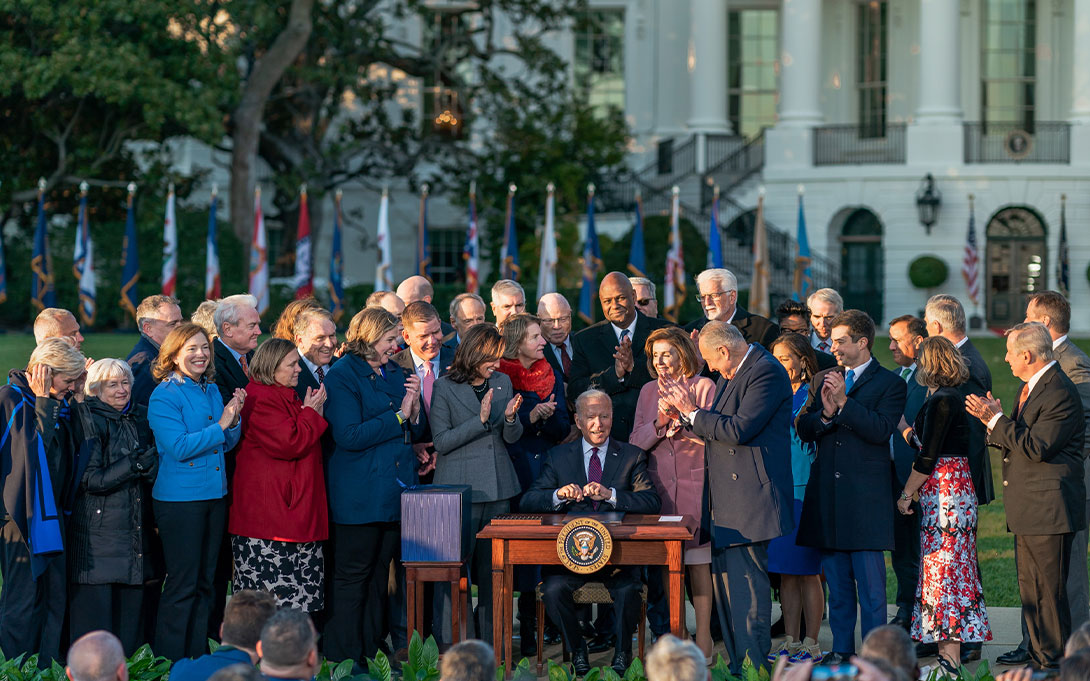
After months of haggling and horse-trading, Congress has passed—and President Joe Biden is poised to sign—a more than $1 trillion infrastructure bill. The law will usher in long-sought investment in roads, rail, bridges, broadband, the power grid and clean, safe water.
The plan is far more modest than originally intended, as is common with bipartisan legislation, but still historic in terms of its aims and reach.
University of Michigan Ford School experts are available to discuss.
Barry Rabe
Barry Rabe is a professor of public and environmental policy at U-M’s Ford School of Public Policy. He examines the political feasibility and durability of environmental and energy policy, with a focus on efforts to deal with climate change in the United States and other nations.
“The passage of federal infrastructure legislation represents the achievement of a long-discussed legislative goal,” he said. “But it is only the beginning of a process to convert new spending into actual infrastructure, ranging from new highways and bridges to updated water lines and electric vehicle charging networks. We should not assume that agreeing to expanded budgets automatically assures full and timely implementation.”
Contact: [email protected]
Betsey Stevenson
Betsey Stevenson, a professor of public policy and economics at U-M’s Ford School of Public Policy, was a member of the Council of Economic Advisers from 2013-15, where she advised President Barack Obama on social policy, labor markets and trade. She also was the chief economist of the U.S. Department of Labor from 2010-11.
“The bipartisan infrastructure package passed by Congress will provide America with historic investment in critical infrastructure necessary to support human flourishing and business investment,” she said. “It will help restore America’s global competitiveness by enhancing funding for productivity boosting investments like expanding access to high speed internet, improving the roads and transportation systems and modernizing the power grid.
“It will also prepare us for the future with investments needed to address climate change. The infrastructure bill will support the shift toward cleaner energy technologies and allow American consumers to access cleaner transportation options through investments in hybrid buses and charging stations for electric vehicles.
“This is government spending that we know pays for itself by directly facilitating greater economic growth and by spurring greater investments by the private sector. Our current supply chain challenges point to the fact that these investments are long overdue. Our climate challenges point to the fact that these investments are essential to address the ongoing climate crisis.”
Contact: [email protected]
Richard Hall
Richard Hall is a professor of political science at U-M’s College of Literature, Science, and the Arts and professor of public policy at the Ford School. His research focuses on American national politics. He has studied participation and representation in Congress, campaign finance reform, legislative oversight, and lobbying in Congress.
“Passing the infrastructure bill provided President Biden with a significant victory,” he said. “In the 2016 campaign, Trump repeatedly promised to enact such a bill, yet even though the Republicans held solid majorities for two years, Trump could not get it done.
“Biden did so with razor thin majorities in both chambers and achieved some bipartisanship to boot.
“But by itself, I don’t think the infrastructure bill will change the narrative that Biden’s agenda is falling apart and he cannot unify his own party. In its current form, the Build Back Better bill will be a much harder sell to Joe Manchin and Kyrsten Sinema. The major concessions they will demand can only alienate progressive Democrats in the House, reopening the divisions that Pelosi managed to paper over last week. And the Democrats will be working on a much shorter time clock.”
Contact: 734-763-4390, [email protected]


